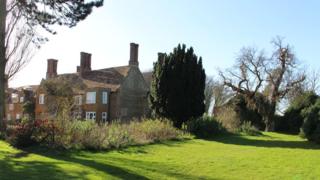
 Image copyright Carolyn Johnson
Image copyright Carolyn JohnsonTests aiming to establish the truth of a legend claiming that Pocahontas planted a mulberry tree in Norfolk have proved inconclusive.
The Native American travelled to England in 1616 with husband John Rolfe after helping save a colonialist’s life.
Legend has it she planted a mulberry tree at a manor house in Heacham, where Rolfe was from.
But DNA analysis of the tree and others have proved inconclusive.
Rolfe and Pocahontas spent 10 months in England – before her death in Gravesend, Kent, in 1617 – when it is said she planted a tree at her husband’s family home, now Heacham Manor Hotel.
- Pocahontas was the daughter of Chief Powhatan, leader of a Native American tribe
- Legend has she negotiated the release of Capt John Smith, earning her a reputation as a peacemaker
- After Smith returned to England, she was captured and spent a year in the English encampment
- There she converted to Christianity and married John Rolfe, adopting the name Rebecca Rolfe
- During her time in England she was received by the court of King James I
- Pocahontas was buried in the chancel of St George’s Church, Gravesend, on 21 March 1617
Researchers at the Forestry Commission carried out DNA research following claims by a retired Heacham resident who has extensively researched the Pocahontas legend.
It was hoped this might establish a DNA connection between the hotel’s tree and other very old mulberry trees at Buckingham Palace, Syon House in west London and Narford Hall, Norfolk.
It was thought Pocahontas might have visited one of these trees and collected seeds, and research could establish whether they were forebears of the Heacham tree.
Joan Cottrell, from the Forestry Commission, said scientists had “attempted to fingerprint” eight trees “but failed to get clear results”.
She said tests showed the eight trees “probably” belonged to the same clone, but that the work was “not conclusive”.














